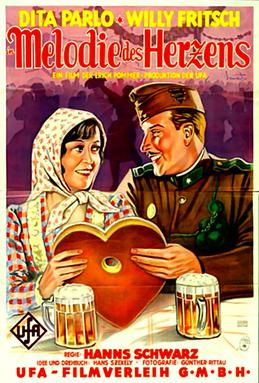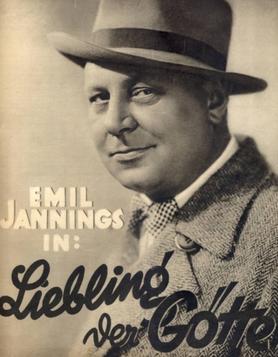UFA GmbH, shortened to UFA, is a film and television production company that unites all production activities of the media conglomerate Bertelsmann in Germany. The original UFA was established as Universum-Film Aktiengesellschaft on December 18, 1917, as a direct response to foreign competition in film and propaganda. UFA was founded by a consortium headed by Emil Georg von Stauß, a former Deutsche Bank board member. In March 1927, Alfred Hugenberg, an influential German media entrepreneur and later Minister of the Economy and Minister of Agriculture and Nutrition in Adolf Hitler's cabinet, purchased UFA and transferred ownership of it to the Nazi Party in 1933.

Oskar Messter was a German inventor and film tycoon in the early years of cinema. His firm Messter Film was one of the dominant German producers before the rise of UFA, into which it was ultimately merged.

Erich Pommer was a German-born film producer and executive. Pommer was perhaps the most powerful person in the German and European film industries in the 1920s and early 1930s.

The Three from the Filling Station is a 1930 German musical film directed by Wilhelm Thiele and starring Lilian Harvey, Willy Fritsch, Heinz Rühmann, and Oskar Karlweis. Produced by Erich Pommer, the film was a major success for the UFA studio, outgrossing even The Blue Angel. Several songs composed by Werner R. Heymann and performed by the Comedian Harmonists have remained popular up to today. The film also had a heavy influence on Hollywood musicals during the 1930s.
Jules Greenbaum was a German pioneering film producer. He founded the production companies Deutsche Bioscope, Deutsche Vitascope and Greenbaum-Film and was a dominant figure in German cinema in the years before the First World War. He is also known for his early experiments with sound films around twenty years before the success of The Jazz Singer made them a more established feature of cinema.

Bavaria Studios are film production studios located in Munich, the capital of the region of Bavaria in Germany, and a subsidiary of Bavaria Film.

Melody of the Heart is a 1929 German musical film directed by Hanns Schwarz and starring Dita Parlo, Willy Fritsch and Gerő Mály.

Darling of the Gods is a 1930 German musical drama film directed by Hanns Schwarz and starring Emil Jannings, Renate Müller and Olga Tschechowa. Jannings had recently returned from Hollywood where the arrival of sound films had harmed his career. The film was made at the Babelsburg studios, and based on the play Die Tokaier by Hans Müller. It was made by Erich Pommer's production unit, part of the German Major film studio UFA. It premiered at the Gloria-Palast in Berlin on 13 October 1930.
The Projektions-AG Union was a German film production company which operated between 1911 and 1924 during the silent era. From 1917 onwards, the company functioned as an independent unit of Universum Film AG, and was eventually merged into it entirely.

Waltz of Love is a 1930 German musical film directed by Wilhelm Thiele and starring Lilian Harvey, Willy Fritsch and Georg Alexander. It was shot at the Babelsberg Studios in Berlin with sets designed by the art director Erich Kettelhut. It premiered at the Gloria-Palast in Berlin on 7 February 1930. A separate English language version The Love Waltz was also produced.
The Love Waltz is a 1930 German English language musical film directed by Carl Winston and starring Lilian Harvey, Georg Alexander and John Batten. It is the English-language version of Waltz of Love (1930) which also starred Harvey.
Eberhard Klagemann was a German film producer. During the 1930s, he worked for UFA as an assistant producer under Erich Pommer and later for 20th Century Fox's German subsidiary. Following the Second World War, Klagemann was issued a license to make films by Pommer, now Film Control Officer for the Allied occupiers of Germany. Pommer judged that he along with several other old colleagues had avoided becoming too closely involved with the Nazi regime: "Certainly all of them have been proven to be no Nazis. Eberhard Klagemann seems to have been cleverly able to also stay away from the Nazis. He surely is an opportunist and therefore should be handled with care. Too bad, because he knows more about our business than all the others".
Phoebus Film or Phoebus-Film was a German film production and distribution company active during the silent era. It was one of the medium-sized firms established during the early boom years of the Weimar Republic. It had a distribution agreement with the American studio MGM.
National Film or National-Film was a German film production and distribution company which operated during the silent and early sound era. In the early 1920s it made an attempt to take over Erich Pommer's Decla-Bioscop, but the projected merger failed and Decla instead joined with the major studio UFA. While Decla was generally in favour of joining with National, it was pressured by its creditors Deutsche Bank to merge with UFA.

The Tempelhof Studios are a film studio located in Tempelhof in the German capital of Berlin. They were founded in 1912, during the silent era, by German film pioneer Alfred Duskes, who built a glass-roofed studio on the site with financial backing from the French company Pathé. The producer Paul Davidson's PAGU then took control and constructed a grander structure. The First World War propaganda drama The Yellow Passport, the historical comedy Madame DuBarry and the expressionist 1920 silent film The Golem were made there by PAGU.

The Weissensee Studios was a collection of separate film production studios located in the Berlin suburb of Weißensee during the silent era.
Decla-Film was a German film production and distribution company of the silent era, founded by Erich Pommer and Fritz Holz in February 1915.

The Marmorhaus is a former cinema located on the Kurfürstendamm in Berlin. Opened in 1913, it takes its name from a large marble façade. Designed by the architect Hugo Pál, the walls of the foyer and auditorium were decorated by the expressionist artist Cesar Klein.
Ernst Hugo Correll was a German film producer active during the Weimar and early Nazi eras.








